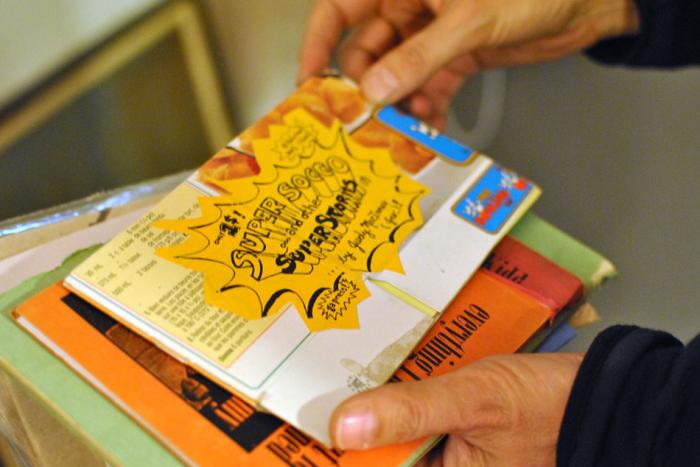February 17, 1970
There’s a daily ritual here—at dusk everybody in the caves comes out and gathers on the rocks to watch the sun go down. Not the Greeks, though, they think we’re crazy. Although the refrigerator lady, Irena, usually comes by then to sell us cold Pepsis. She likes to laugh at my eight words of Greek and try on my bracelets. The sun’s the same every night, big and fat and red, sort of squished-looking. When it touches the horizon it’s like a yolk breaking in a pan, and the red pours out into the sea. Sometimes this draft dodger guy, Yogi Joe, plays his congas on the beach. He’s a good yoga teacher but he’s got really bad time on the skins.
I tried to paint a picture of the cliffs on the far side today, but I’m running out of white. I’ve gone through a whole tube trying to get the brightness here, it’s so intense. Gentle pinks and blues only show up at dusk. I’ve got tons of yellow and indigo though. Van Gogh’s palette. Maybe I could make Matala look like Arles instead… (I bet a lot of artists develop their “style” that way—by running out of certain colours.)
The other day I started to paint a tiny portrait of Carey on the inside of a pack of Salems but he wouldn’t sit still long enough. It looks more like James T. actually. Even Carey thought so. It put him in a jealous sulk, actually!
There was a going-away party the other night for Bernardo, the Peace Corps guy, in a cave way up on the western cliffs. We had to use a rope to swing across a little gap to reach it. Bernardo has a shaved head and never speaks. Everybody was singing The Weight—I played my new dulcimer and Joe played his damn drums. I made up a different tuning for the dulcimer that I think really works. It’s like a santourini (??) only smaller. But the santourini is chromatic, I think, with lots of hammered keys. A mainland instrument, you don’t hear it much here on Crete.
Finished “A Case of You”. Everything I’m working on now is so personal and particular, I’m worried DG won’t like it. He doesn’t even know I’m here—the mail is probably piling up in Athens. He’ll be pissed. This is going to be more of a road album, and nothing like ‘Ladies’. Oh well, if they don’t like it, I’ll just give up music and paint. Cigarettes go better with painting anyway. I don’t care, I’m gonna smoke til I drop, I love it.
I’ve started writing a couple new tunes but I don’t have a piano and anyway working hard at anything seems silly here. It feels like a full-time job just lying in the sun, floating in the sea and eating those damn honey-cakes. The days sparkle in the morning and then dissolve like sugar in water. My feet are covered in beach tar—Penelope says you can get it off with kerosene though.
I hope things work out with her and Ramon. He’s cute and a really good dancer but I don’t trust him. Somebody stole her camera and she swore it was a tourist. But they already have cameras…
Friday, February 19th
I moved into Carey’s room last night. Pen and I slept in one of the caves for five days, which was surprisingly comfortable—they stay pretty cool all day—but when she moved in with Ramon I decided to take up Carey’s offer. Plus the flies can get pretty bad in the heat of the day. I guess I’m not that good a hippie when it gets down to it. Still got the dry cleaner’s crease in my Paris pants.
Carey’s room is small and a bit of a mess but I moved the bed under the window so we can see the stars at night—so many, like a silver sieve in the sky. I keep my silver bracelets with his dope in a little carved wooden box from Goa. But I wear them when we go dancing—Carey’s got a silver cane, so we match.
It’s after dark now and I’m waiting for him to get home from work. He smells of lamb and oregano when he comes in the door. Yesterday I washed that horrible turban of his—I mean, it’s gotta be hot wearing it, and it sure did stink. I washed it out back in the bakery lady’s sink and draped it in the branches of her grape tree. I think he started wearing it after the stove explosion. (Did I write that yet? Pen and I are fresh off the bus, we’re sitting on the beach in front of Delfini’s drinking a beer, when we hear this explosion—I thought it was a bomb. Then we see a guy in white, with all this curly red hair, ON FIRE, running out of the kitchen, yelling! A gold heart in one ear, a gold loop in the other. Pen and I helped put the flames out with our beach towels. He wasn’t badly hurt, thank god, just lost his eyebrows and the hair on his arms. Then we got to talking.
He’s not your type, Penelope kept hissing in my ear, things blow up around him—stay far far away.
Then a day later, she goes and falls for someone like Ramon. And I end up with Carey.
The usual rules kind of fall apart here.
Sunday February 21
Yesterday Carey and I went up the coast a ways to the “red beach”. The rocks there are really old and scoured with trenches and furrows. No trees. The land is hard and naked but curvaceous, like a huge human body. We smoked a joint and lay in a natural crevice full of warm seawater, with bandannas over our eyes. I could feel the energy of the sun pouring down and the energy of the rock radiating up through us. So powerful. I felt like the lightest of insects, a dragonfly, temporary and iridescent. I had this mad urge to paint the place, or write a song about it, and then I thought: leave it alone. It’s awful when you feel something, and then make that mental note: good material.
I wish I knew where things were going with Carey. But there are all kinds of things you don’t talk about here in Matala, and the future is number one on the list.
Tuesday, Feb. 22, 1970
Joe says the Greek tuning for my dulcimer should be DAA, but so far DAD works better for me. I need some lighter picks too. (Shopping list: white paint, thin picks, and a new Premarin prescription. Sometimes I wonder if being on the pill is what’s making me so blue lately. Maybe I’ll call the new album Premarin.)
I like having to play the dulcimer in my lap, it kind of grounds me, and I like how it’s both melodic and rhythmic at the same time. A one-woman band. It sounds old and folky but shiny and modern too. Joe told me that the balalaika, that Zorba sound everyone associates with Greece, evolved from the santourini which has up to 115 notes! As opposed to four strings on the Appalachian dulcimer. But that makes sense, Greece is a hundred times older than America, musically speaking. The santourini is more like playing the guts of a piano, and the dulcimer is string-ier. DG will probably say it’s too weird for the album, stick with what you know. Those guys gotta get out more.
I got another letter from Richard. He wants to meet me in March, in Paris, in some dark café no doubt, but I can’t seem to get motivated. Every day I think I should leave Matala, and then the next thing I know it’s sunset again, we’re playing music on the beach and the warm wind is sweet and pillowy, too sweet to leave behind. Carey cooks potato omelettes all night down at Delfini’s then he comes home and cooks one more “special one” for me. The olive oil here is the colour of baby snakes and you can drink it straight. He uses my camera to take pictures of me eating… he says I eat like a prairie dog, not that he’s ever seen one. He likes to kiss me right after, to taste his own cooking—gross! The other night he took a picture of me sleeping and of course the flash woke me up. “You sleep like a fucking goddess,” he said. He was standing on our one chair, naked, with my camera in his face. I had to laugh. Then we were both awake so we made love again. He’s noisy in bed. I can never stay mad at him.
March 9th, 1970
My feet are turning into hooves from walking barefoot on the sand. I’m half goat, and I’ve only been here three weeks—four? It feels like forever. Time is like a hokey new invention here, something that only made it to the village recently, like Coca Cola.
The village was full of soldiers last night, but they’re okay, just bored shy boys. In the moonlight, the uniforms don’t mean much. They’re only here to make sure the dope smoking and naked dancing don’t get too out of hand. One of them danced with me, he came right over, threw my cigarette away and just took my hand. Another had a balalaika and he let me hold it. When he saw I could actually play it, he got angry and took it back! The men are very macho here. Carey got a bit jealous, even though he likes to see me dance. But everyone dances with everybody anyway. I was fooling around, twirling Carey’s cane like a cheerleader baton. Silly,fun.
Nobody talks about America or the war, but it runs in the background just the same. The other night I was playing backgammon at the Mermaid with this guy who had just come back from Vietnam. He lost, and got so angry. It was intense. I asked him about the war, what it was like for him, how the soldiers felt about all the demos back home, about Bobby Kennedy getting killed, but he didn’t want to talk about any of it. He called me Blondie. “You’re killing me, Blondie…” Mostly he just wanted to win our game, so eventually I let him. He asked if there was any heroin around, but if there is I haven’t seen it. The only thing I’m hooked on is Gauloises and I’m running out of them too.
[ Little pencil sketch of the Refrigerator Lady here]
Sunday March 17th
Four good songs is good but not enough. After this album is done, I’m going to paint more and sing less. The music biz is too insane. The art part gets lost so fast. I may be crazy, but not that sort of crazy.
Carey and I went back to our secret cove. Lay in the same cleft of warm seawater with just the tips of us, nose, breasts, toes, sticking out. Matala is all about floating weightless. But it’s easy to blow away here too. To get lost in a different way. I think Carey’s been here too long. He told me he’s from San Francisco, via Paris, where he was a chef in a highpriced joint. Then something happened, I’m not sure what. He won’t say. Maybe a drug bust. He has a little girl back in America with her mother. Sintra, her name is. It’s the name of a place on the coast near Lisbon, he says.
Someone told me Cat Stevens visited the caves last winter. Others say Bobby Dylan came to Crete too, but he went to some other beach where nobody goes. Typical! Anyway I don’t think Cat likes me much after my thing with James T.
We went to a wild party up on the cliffs the other night, where everybody was taking these cough-medicine pills, Romillar (??) that have codeine and speed in them. You can buy them over the counter in any local farmacia. The police only care about weed, and technically they can’t bust the caves because this is an archeological site, which means the police don’t have jurisdiction here. I didn’t take any—I’m still trying to get my head straight after Jamaica. Everybody was moving in slow motion, wafting their arms in the air, like geese trying to fly. Apparently it makes everything very soft and floaty.
That guy Hoot from Amarillo flirted with me. He’s got those blue sailor eyes I’m a sucker for. Nice guitar too—I borrowed it to try out the new song, A Case of You, and people liked it. It’s better faster I realize. After Ladies, it’d be good to get uptempo. “When I think of your kisses, my mind see-saws…” Hope LC approves.
Right now I’m trying to write a song about Carey, but I’m not sure about using his real name. Maybe I’ll change it. Dennis? The poor Dennises of the world, nobody ever writes them a song…”Oh Dennis, get out your cane…” Naah.
Carey and I never talk about our “home” lives, so I haven’t said anything about G., even though he’s on my mind still, all the time. It takes so long to figure out when something’s over—it’s like love has a longer life span than normal humans. I keep remembering the times when I used to come home late, maybe a little guilty, and I’d catch him writing at the wooden table in the kitchen. Our very fine house. His face full of everything he never tells me.
The mail comes here once a week. Yesterday there was a postcard for Carey, from Sintra and her mother. I brought it to him. That was awkward.
I’ve worn out my bathing suit here—I didn’t think bathing suits could wear out. Some of the girls go topless but I’m too shy. My nails are a wreck. I’m just spoiled, I guess. I went up the cliff a ways and got a big bunch of those little white wildflowers to put around our room.
I’ve taken to wearing one of those Greek peasant blouses with embroidery and a drawstring neck. I bought two in Pitsidia, at the market. It’s funny how tourist stuff grows on you after a while, even when it’s sort of hokey. It starts to make sense, like the colours people paint their houses in hot countries—the flowers and the light make the turquoise and pink houses look natural. But when you try to take the colours back home, they don’t look right. L.A. is grey and ocean-silver, with flashes of red—blood, birds of paradise, leather car seats…Carey would fit right in.
The other funny thing is, I never eat potatoes usually, but they taste so good here. Everything tastes good, even my own skin—it’s always salty, from sweat and swimming. We can use Irena’s outdoor shower for a dollar, but hardy anyone bothers. The sea takes care of us.
We’re low on kerosene so I should put the lamp out. If we don’t buy any more, that’ll mean it’s time to leave. I found the ferry schedule to Athens in my jacket pocket too: another sign.
Carey’s late, so I think might have to go fetch him. Maybe I’ll put on my bracelets too. I can hear music playing down in the cafés.
--
Copyright Marni Jackson 2013






